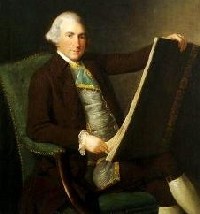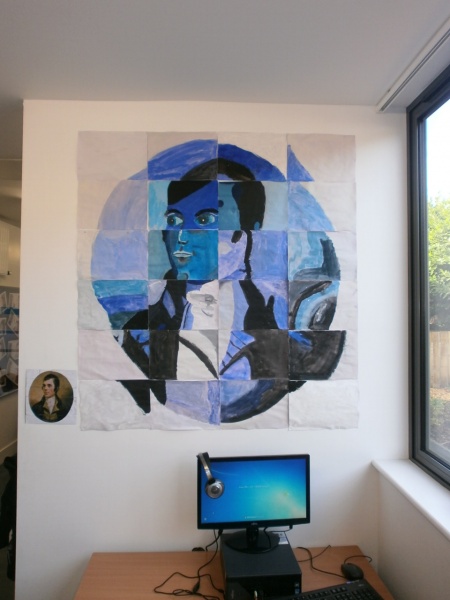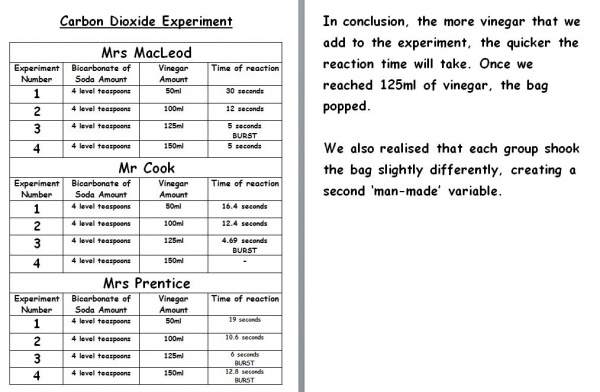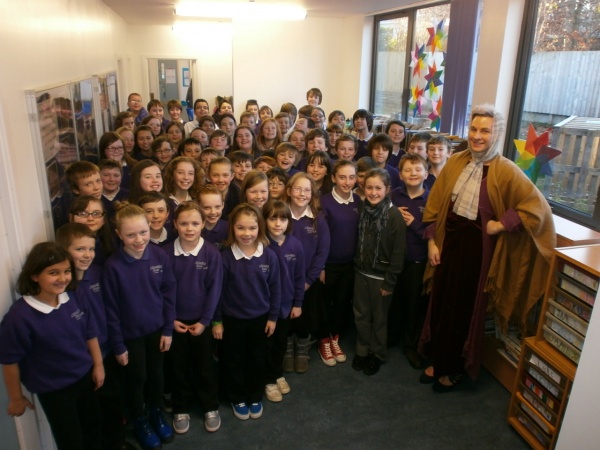Tag Archives: Scottish Enlightenment
What about Rocks…?
Your ICT homework for Wednesday 6th February 2013:
-
Find the name of the three different generic categories used to clasify rocks and their description. Post their names on the blog.
-
Write out the website address of ANY appropriate website- we will be using this in writing this week.
Today we watched a video about the continental drift, spanning over 600 million years. It can be found below:
[kml_flashembed movie="http://www.youtube.com/v/cQVoSyVu9rk" width="425" height="344" allowfullscreen="true" fvars="fs=1" /]
Continental Drift video: CLICK HERE!
 James Hutton, a Geologist during the Scottish Enlightenment, discovered that he could estimate the age of the Earth using Rocks. Later this week we will be clasifying rocks using his categories.
James Hutton, a Geologist during the Scottish Enlightenment, discovered that he could estimate the age of the Earth using Rocks. Later this week we will be clasifying rocks using his categories.
See you tomorrow,
Mr.Cook, Mrs.MacLeod and Mrs.Prentice
Bonanza for Burns
REMINDER: P7 parent/carer meeting for the IRA is TONIGHT (Thursday) at 7pm in Lochardil Primary School Hall.
 Tomorrow, we’re going to be going all out for Burns. There will be a quiz in the morning, a maths task themed for Burns, and the opportunity to wear something tartan. There will be a donation box for ‘Kilts for Kids’ for those who would like to make a donation.
Tomorrow, we’re going to be going all out for Burns. There will be a quiz in the morning, a maths task themed for Burns, and the opportunity to wear something tartan. There will be a donation box for ‘Kilts for Kids’ for those who would like to make a donation.
Kilts for Kids- WEBSITE
Yesterday, some people had trouble watching the videos on their tablets, click the links below, and they will take you there:
Carbon Dioxide Sandwich: Experiment
P6/7 Experiment VIDEO
BLOG HOMEWORK FOR FRIDAY: Write a sentence for each of the Enlightenment figures you learned about last week on the BLOG COMMENT BELOW: Alison Rutherford, Robert Adam and James Watt- saying ONE thing that you have learned about their work during the Enlightenment.
See you tomorrow,
Mr.Cook, Mrs.MacLeod and Mrs.Prentice
Joseph Black- Crazy Chemistry!
BLOG HOMEWORK FOR FRIDAY: Write a sentence for each of the Enlightenment figures you learned about last week on the BLOG COMMENT BELOW: Alison Rutherford, Robert Adam and James Watt- saying ONE thing that you have learned about their work during the Enlightenment.
 Today we learnt about the success of Joseph Black- a chemist who discovered carbon dioxide. Once we had agreed on what carbon dioxide is, a gas; the impact it’s having on the world, global warming; and some of its sources, car fumes; we were able to try and grasp what it might ‘look like’.
Today we learnt about the success of Joseph Black- a chemist who discovered carbon dioxide. Once we had agreed on what carbon dioxide is, a gas; the impact it’s having on the world, global warming; and some of its sources, car fumes; we were able to try and grasp what it might ‘look like’.
But how could we create carbon dioxide, and capture it? Well… Steve Spangler had an idea: (watch the video below)
[kml_flashembed movie="http://www.youtube.com/v/y4yaUYEfEjQ" width="425" height="344" allowfullscreen="true" fvars="fs=1" /]
Mr Cook was reluctant to do the science experiment as it looked a little ‘foamy’. Mrs Prentice had offered, but SUDDENLY ‘hurt her arm’. Mrs MacLeod had ‘cut her finger’; therefore Mr Cook left with no choice. With his marigold gloves, safety glasses and apron, he was able to do the experiment.
 At first he showed the reaction between bicarbonate of soda and vinegar. He then showed what it would be like for 50ml of vinegar, keeping all of the other variables the same, before showing 100 ml.
At first he showed the reaction between bicarbonate of soda and vinegar. He then showed what it would be like for 50ml of vinegar, keeping all of the other variables the same, before showing 100 ml.
We then got into groups and tried the experiment ourselves. Each group had to measure out a different amount of vinegar, but keep each other item the same. We found that when we reached 125ml, it POPPED!
WE have recorded our answers in the table below, and made our conclusions.
Mr Marigold ended with one final experiment, showing what 200ml looks like- WATCH OUR VIDEO BELOW!
[kml_flashembed movie="http://www.youtube.com/v/UIxTaNdhpFI" width="425" height="344" allowfullscreen="true" fvars="fs=1" /]
See you tomorrow,
Mr.Cook, Mrs.MacLeod and Mrs.Prentice
Our poetry… revealed!
BLOG HOMEWORK FOR FRIDAY: Write a sentence for each of the Enlightenment figures you learned about last week: Alison Rutherford, Robert Adam and James Watt- saying ONE thing that you have learned about their work during the Enlightenment.
 As promised on Friday, the video of Alison ‘performing’ our poems can be found below. You will need the password, which we gave you in school today, to watch the video. If you’re a parent/carer and would like access- please email the address below for the password, and we will have it sent to you.
As promised on Friday, the video of Alison ‘performing’ our poems can be found below. You will need the password, which we gave you in school today, to watch the video. If you’re a parent/carer and would like access- please email the address below for the password, and we will have it sent to you.
jcook133@highlandschools.org.uk
Alison Rutherford Video: CLICK HERE!
The AUDIO RECORDINGS can be found by clicking the links below:
Alison Rutherford MM- RECORDING
Alison Rutherford JC RECORDING
Alison Rutherford AP- RECORDING
Happy Viewing!
Mr.Cook, Mrs.MacLeod and Mrs.Prentice
Alison Rutherford
P6/7’s final visitor this week was Alison Cockburn, (Formally known as Alison Rutherford before her marriage) Edinburgh poet and socialite. We were lucky enough to have an ACTUAL visit from Alison. She told us about her friendship with Robbie Burns, her parties in her Edinburgh town house, and her love for the English language. With Alison, we wrote an acrostic poem. We read her version of ‘Flowers of the Forest’, and created our own ‘Flower Acrostic’. Mr Cook was unfortunately at the dentist, so missed her visit…
Our poems are below, click on each image to enlarge:
 Flowers acrostic- MM
Flowers acrostic- MM
Flowers acrostic- AP
Flowers acrostic- JC
We’ll be releasing the video of Alison ‘performing’ these poems on Monday!
Have a great weekend, on behalf of Alison,
Mr.Cook
Robert Adam

 The second Enlightenment VIP we have had visiting P6/7 was Robert Adam, famous architect and designer during the Enlightenment period. His designs were iconic, and have lasted with us into the modern day. Mrs Prentice showed us some of the techniques which Adam used. We’ve begun creating our own Robert Adam style doors, which will house some of his fantastic patterns. Check back to the blog when we have completed them for pictures.
The second Enlightenment VIP we have had visiting P6/7 was Robert Adam, famous architect and designer during the Enlightenment period. His designs were iconic, and have lasted with us into the modern day. Mrs Prentice showed us some of the techniques which Adam used. We’ve begun creating our own Robert Adam style doors, which will house some of his fantastic patterns. Check back to the blog when we have completed them for pictures.
Learn more about Robert Adam by clicking the link below:
Robert Adam: CLICK HERE FOR MORE INFO!
Have a great weekend,
Mrs.Prentice
James Watt
Our first VIP this we met during ‘The Scottish Enlightenment’ was James Watt- the man who improved the Steam Engine. Mrs MacLeod showed us how steam is formed within the kettle, and the power it creates. James Watt realised that when placing a cold metal spoon next to the kettle, the steam quickly condensed back into water. He used this as a basis for improving the steam engine.
To find out more about James Watt click below:
Meet James Watt: CLICK HERE!!
Have a great weekend,
Mrs.MacLeod
Tetrahedron Workshop…
Reminder: Specialist Group C are SWIMMING tomorrow. Remember your swimming kit!
Thank you Billy (from Construction Skills) who came to do a Tetrahedron Building workshop. Billy taught us that there are lots of skills in the construction industry that are developed when completing activities. Some of the skills which we had to develop were: Problem Solving, Listening, Team Work and Talking.
All of the teachers have argued that each of their own register classes were the best, but Billy managed to slip out of the school before he told us who was the best register class. We think it was wise- we don’t want to start a riot!
Check the blog tomorrow, to see what we have learned the past two Thursdays, about some of the key people during the Enlightenment.
Mr.Cook, Mrs.MacLeod and Mrs.Prentice
What difference did it make?
 Reminder: Billy will be back from Construction Skills tomorrow to work with Mrs.Prentice’s class. There will be NO PE tomorrow, so you do not need kit!
Reminder: Billy will be back from Construction Skills tomorrow to work with Mrs.Prentice’s class. There will be NO PE tomorrow, so you do not need kit!
Our challenge today was to re-write the history of ‘The Scottish Enlightenment’ using our own words. We had to focus on interesting vocabulary, connectives, openers and punctuation; which would not only give the main points, but also engage the reader.
Here is one example which we felt met most of the criteria…
‘The Scottish Enlightenment’ – James.H (P7)
‘Over 300 years ago a revolution swept across Scotland. This period of time in the 18th century, known as The Scottish Enlightenment, is often described as Scotland’s ‘Golden Age’. The Scottish people of that age excelled in many different fields of knowledge suchas economics and philosophy, and became world-renowned for those subjects. There were many different individuals who changed Scotland (and the world) forever. They came up with ideas to make the world a better place; bear in mind these ideas were often controversial. Before the Enlightenment period Scotland was very poor. So how did we become so good?
The first thing that helped change Scotland is that many of the scholars travelled abroad and brought back new ideas from their destinations. This helped to improve Scottish Universities. One example is the founders of the outstanding Edinburgh University medical school, who travelled to the world’s best medical school in Holland.
Secondly, after the Reformation, the Reformers put schools in every parish so that people could read the Bible. The children were around nine years old and went to school for about four years. Also, when the parliaments united the Scottish people lost their political rights, and while that infuriated the country, it also meant the intellectuals didn’t have to take sides. In turn, that meant that there was a flow of free information.
Finally, the Scottish universities were the best in the UK. They also had five of them- the most in the UK! The universities were open to ideas from across the globe which helped make them successful. In the 17th century the universities were only of minor significance, but by the 18th century they were changed fundamentally. Another change was that the universities had more than one teacher, known as ‘Professors’.
All of these points- and many more- helped fuel the Scottish Enlightenment and shape the world as it is today. If Scotland were to have another golden age it would, once again, change the world forever. 300 years have passed and since then we still think about the time. I think that without the Enlightenment we would live in a very different world today.’
Check the Enlightenment video by clicking the link below:
Scottish Enlightenment BBC: CLICK HERE!
See you all tomorrow!
Mr.Cook, Mrs.MacLeod and Mrs.Prentice
It didn’t just happen…
 You may be thinking it’s too early for Burns… BUT The Scottish Enlightenment did not just happen… inspiring people made it happen.
You may be thinking it’s too early for Burns… BUT The Scottish Enlightenment did not just happen… inspiring people made it happen.
Specialist Group A made this ‘larger than life’ portrait of Robbie Burns in Art with Mrs Prentice on Friday. We’ll learn a little more about how Robbie contributed to The Scottish Enlightenment next week.
 Another one of those people was Adam Smith- an economist who used the philosophy of morality to make the big bucks. We found out today that he improved the standards for his workers, to improve the quality of their work. We’ll find out a bit more next week by what Adam Smith meant when he said: ‘To feel much for others, and little for ourselves.’
Another one of those people was Adam Smith- an economist who used the philosophy of morality to make the big bucks. We found out today that he improved the standards for his workers, to improve the quality of their work. We’ll find out a bit more next week by what Adam Smith meant when he said: ‘To feel much for others, and little for ourselves.’
See you all tomorrow,
Mr.Cook, Mrs.MacLeod and Mrs.Prentice
Let’s get together…
SWIMMING: Group B, it is your LAST swimming session tomorrow!
What a fantastic day today was. The founding figures of ‘The Scottish Enlightenment’ would be proud to see how hard Scotland’s children work in school on a day like today.
 THANK YOU BILLY (Construction Skills Scotland) for working with Mrs MacLeod’s and Mr Cook’s register groups. He’ll be back next Thursday to work with Mrs Prentice’s. Then he’ll be able to choose the winner out of the three.
THANK YOU BILLY (Construction Skills Scotland) for working with Mrs MacLeod’s and Mr Cook’s register groups. He’ll be back next Thursday to work with Mrs Prentice’s. Then he’ll be able to choose the winner out of the three.
Without even knowing it, you developed some of the skills which were demonstrated by those who made the enlightenment a success. You developed knowledge and skills today in: technology, architecture, poetry, engineering, history, team work, listening and talking whilst working with Billy, Mr Cook, Mrs MacLeod and Mrs Prentice.
 We can’t reveal ANY photos or videos until next week, as it is a SURPRISE what the other groups got up to. Remember- shhh- don’t tell anyone in any other register class, you want your register class to win!
We can’t reveal ANY photos or videos until next week, as it is a SURPRISE what the other groups got up to. Remember- shhh- don’t tell anyone in any other register class, you want your register class to win!
Let’s hope next Thursday is an even bigger success!
See you all in the morning,
Mr.Cook, Mrs.MacLeod and Mrs.Prentice
Welcome back!!
Research Homework: Find out the names of each of the three Wise Men
P6/7 are glad to be back! It sounds like everyone had a fantasic Christmas break, but back at school is where the fun is set to begin.
 This term is an extremely busy term for us. Over the next 5 weeks we will be preparing for Rock Challenge at Eden Court on February 19th. We have the choreography for the main body of our performance, however we have to complete our final number in which we will all be on stage.
This term is an extremely busy term for us. Over the next 5 weeks we will be preparing for Rock Challenge at Eden Court on February 19th. We have the choreography for the main body of our performance, however we have to complete our final number in which we will all be on stage.
This term we will also be studying ‘The Scottish Enlightenment’ as our topic. We found out today that The Scottish Englightenment was a period of time in the 1700s (18th Century), in which Scotland was famous for: philosophy, chemistry, geology, architecture, poetry, engineering, technology, economics, sociology, medicine and history. During this time, also known as ‘The Golden Age’, many people contributed to this, and over this term, we will be learning about their successes.
We have separated our topic into three areas in which we hope to research:
Inventions and Science
How did the scientific and mathematical developments of the 18th century impact the world at that time?
The Arts
Why was Scotland so influential, with regards to the arts, during the 18th century?
Education and Thinking
What made our education system and our way of thinking stand out from the rest of the world?
Our overall outcome is to:
Create a written/multi-media project about an influential person/time in Scottish history. We will be doing this in class individually, in pairs or in small groups.
We are having a think about a fantastic excursion which will support our topic. If you have any ideas/expertise about ‘The Scottish Enlightenment’- please do get in touch!
See you tomorrow,
Mr.Cook, Mrs.MacLeod and Mrs.Prentice




















































































